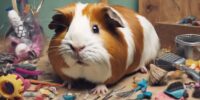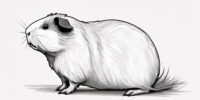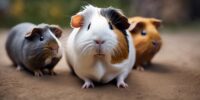What to Do If Your Guinea Pig Stops Eating
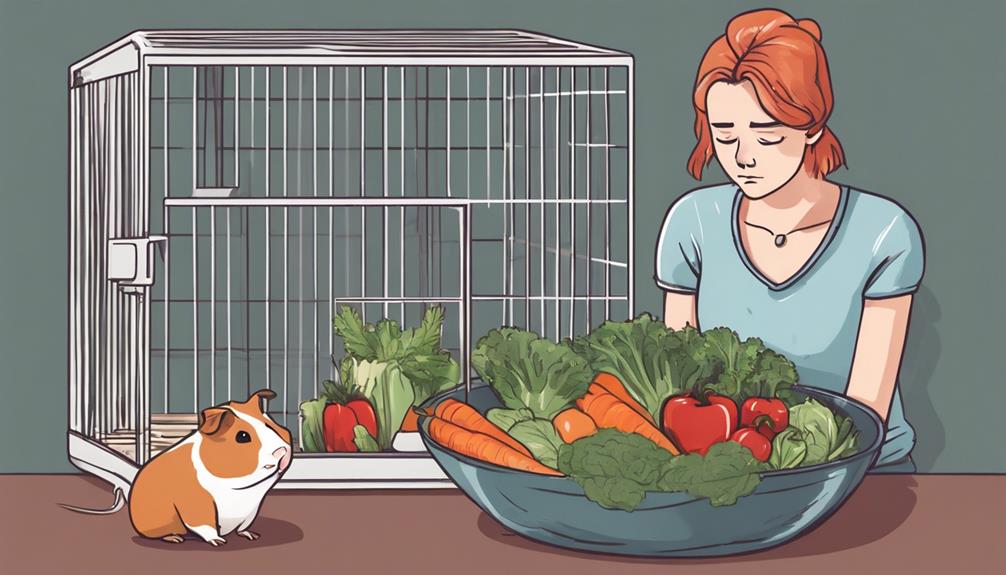
What to Do If Your Guinea Pig Stops Eating:
Stay calm and assess the situation.
Understand the potential causes of your guinea pig's loss of appetite.
Respond promptly to ensure your pet's well-being.
Key Takeaways
- Monitor behavior, weight, and appetite for health insights.
- Provide fresh hay, vegetables, and clean water for nutrition.
- Seek prompt veterinary care for evaluation and treatment.
- Create a stress-free environment with interactive feeders for healthy eating habits.
Common Reasons for Loss of Appetite
When guinea pigs stop eating, it can be due to various common reasons that pet owners should be aware of to make certain their furry friends' well-being. One prevalent cause is dental issues. Guinea pigs' teeth continuously grow, and if they aren't properly worn down through chewing, it can lead to overgrowth, causing pain and difficulty in eating. Dental problems can result in your guinea pig avoiding food altogether.
Another reason for a loss of appetite could be a deficiency in essential nutrients. In such cases, providing nutritional supplements may help stimulate their appetite and address any deficiencies they may have. Ensuring a well-balanced diet is critical to prevent any potential nutritional issues.
If your guinea pig isn't consuming enough food, it's essential to observe their behavior closely and consult a veterinarian promptly to rule out any underlying health concerns. By being vigilant and proactive, you can help your guinea pig maintain a healthy and happy life.
Observing Your Guinea Pig
When observing your guinea pig, pay close attention to any behavior changes as they can indicate underlying health issues. Additionally, monitoring their appetite and weight regularly can provide valuable insights into their well-being.
Behavior Changes Indicate
Upon observing your guinea pig, one can glean valuable insights into their well-being by noting any behavior changes. Guinea pigs exhibit various behavioral cues that may indicate underlying medical concerns. To serve your furry companion better, consider the following:
- Changes in Activity Levels: A sudden decrease or increase in activity could signal discomfort or illness.
- Altered Eating Habits: Pay attention to any deviations in your guinea pig's dietary preferences or appetite.
- Social Interactions: Changes in how your guinea pig interacts with you or other cage mates could be a sign of distress.
Appetite and Weight Monitoring
To guarantee your guinea pig's health and well-being, regularly monitor its appetite and weight. By paying attention to these essential factors, you can detect any potential issues early on and take appropriate actions.
A sudden decrease in appetite could indicate an underlying health concern, while weight fluctuations may suggest nutritional imbalances. If you notice changes, consider incorporating nutritional supplements to make sure your guinea pig receives all necessary vitamins and minerals.
Additionally, appetite stimulants can be helpful in encouraging your pet to eat when experiencing a loss of appetite. Remember, proactive monitoring and timely intervention are key to maintaining your guinea pig's vitality and happiness.
Providing Fresh Hay and Water
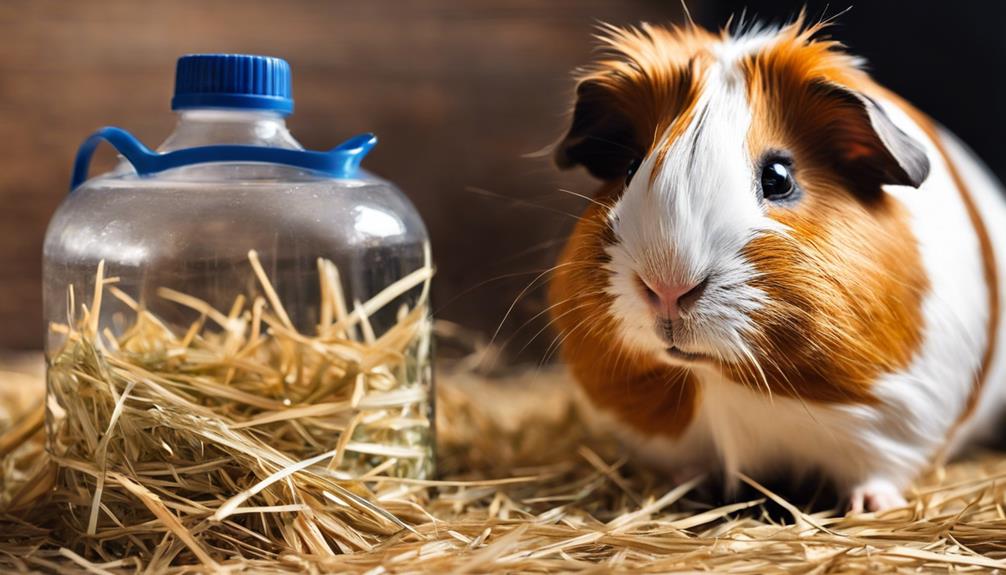
Fresh hay and water are essential for guaranteeing the well-being of your guinea pig. To support your furry friend during a time when they may not be eating as usual, here are some key points to take into account:
- Hay Quality: Guarantee that the hay provided is fresh, fragrant, and free of mold. Guinea pigs rely on hay for essential nutrients and to keep their teeth worn down. Offering high-quality hay is crucial for their digestive health.
- Water Availability: Make sure your guinea pig has access to fresh, clean water at all times. Dehydration can quickly become a serious issue, especially if your pet is eating less than usual. Check the water bottle or dish regularly to ensure it's full and functioning properly.
- Proper Feeding Area: Create a calm and quiet feeding environment for your guinea pig. Place the hay and water in easily accessible locations within their enclosure, away from any sources of stress or loud noises.
Offering a Variety of Vegetables
Ensuring a diverse selection of vegetables in your guinea pig's diet is important for providing essential nutrients and promoting their overall health and well-being. Guinea pigs thrive on a diet rich in vegetables, which not only helps maintain dietary balance but also encourages their appetite. Sometimes, hand feeding techniques can be beneficial in getting a picky guinea pig to eat. Below is a table showcasing a variety of vegetables that you can offer your furry friend to entice their taste buds and ensure they receive the necessary nutrients for ideal health.
| Vegetable | Benefits |
|---|---|
| Bell Peppers | High in Vitamin C |
| Kale | Rich in Vitamin K |
| Carrots | Good source of Beta-Carotene |
| Cucumber | Hydrating and revitalizing |
Seeking Veterinary Care

If your guinea pig's appetite continues to decline despite offering a variety of vegetables, it may be time to seek veterinary care to address any underlying health issues. A veterinary evaluation is essential in determining the cause of your guinea pig's decreased appetite and overall health status. Here are three key steps to contemplate when seeking veterinary care for your furry friend:
- Schedule a Check-up: Book an appointment with a veterinarian who specializes in small animals like guinea pigs. They'll conduct a thorough examination to assess your pet's health and provide appropriate treatment recommendations.
- Discuss Nutritional Supplements: During the veterinary evaluation, inquire about the need for nutritional supplements to support your guinea pig's diet. The vet can advise on suitable supplements to confirm your pet receives essential vitamins and minerals.
- Follow Treatment Recommendations: After the veterinary evaluation, follow the veterinarian's advice diligently. Administer any prescribed medications, supplements, or dietary changes as directed to aid in your guinea pig's recovery and overall well-being.
Monitoring Weight and Behavior
Observing changes in weight is important as it can indicate the overall health of a guinea pig. Additionally, shifts in behavior often signal underlying issues that need to be addressed promptly.
It's wise to seek veterinary guidance at the first sign of concern to guarantee the well-being of your furry companion.
Weight Changes Indicate Health
Monitoring weight and behavior in your guinea pig is essential for identifying any potential health issues early on. Weight loss in guinea pigs can be a sign of underlying health concerns that require prompt attention.
Here are a few key points to take into account:
- Regular Weigh-ins: Weigh your guinea pig weekly to track any fluctuations.
- Observing Eating Habits: Keep an eye on their food consumption and appetite.
- Behavioral Changes: Note any unusual behaviors like lethargy or irritability.
Behavior Signals Underlying Issues
Weight changes in guinea pigs can often serve as a silent but significant indicator of underlying health issues that warrant attention. Observing your guinea pig's weight regularly can provide valuable insights into their well-being.
Alongside weight fluctuations, paying attention to their behavior is essential. Changes in eating habits, reduced activity levels, or signs of distress can all point towards potential health concerns. If you notice any concerning behaviors or weight loss, it's vital to seek medical intervention promptly.
A veterinarian can assess your guinea pig's health status, provide the necessary care, and recommend appropriate nutritional support. Being proactive in monitoring both weight and behavior can help identify issues early, leading to better outcomes for your beloved pet.
Seek Vet Guidance Promptly
For the best care of your guinea pig, it's essential to promptly seek veterinary guidance if you notice any concerning changes in their behavior or eating habits. Guinea pigs are delicate creatures, and any deviation from their normal routine could signal underlying health issues. When monitoring your pet's well-being, keep an eye on their weight and behavior as these are key indicators of their overall health.
Here are some essential points to take into account when seeking vet guidance:
- Regular Weigh-ins: Monitor your guinea pig's weight regularly to track any significant changes.
- Behavioral Changes: Watch for any shifts in behavior such as lethargy or irritability.
- Consultation on Nutritional Supplements: Discuss with the vet about appropriate nutritional supplements for your guinea pig's digestive health.
Encouraging Eating With Hand-Feeding
When a guinea pig loses interest in its food, gently hand-feeding them can help stimulate their appetite and encourage them to eat. By offering tasty and nutritious treats directly to your guinea pig, you can entice them to take a few bites and kickstart their appetite. Additionally, using interactive feeders that make mealtime engaging can pique their interest in food. Here is a helpful table outlining some nutritious treats and interactive feeders you can use:
| Nutritious Treats | Interactive Feeders |
|---|---|
| Leafy greens | Food puzzle toys |
| Bell peppers | Hide and seek feeders |
| Blueberries | Rolling treat balls |
| Carrot slices | Foraging mats |
| Cucumber chunks | Snack-dispensing toys |
Creating a Stress-Free Environment
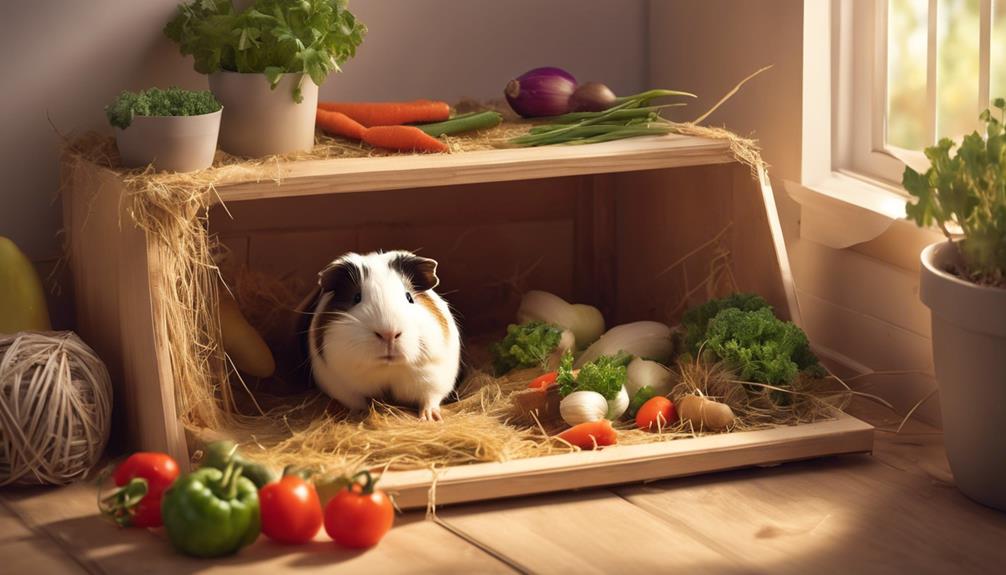
To guarantee your guinea pig's well-being and appetite, fostering a tranquil environment free of stressors is paramount. Guinea pigs are sensitive creatures that thrive in calm surroundings. Here are some essential tips for creating a stress-free environment:
- Stress Management: Identify and eliminate any sources of stress in your guinea pig's living space. This includes loud noises, sudden movements, or other pets that may cause anxiety.
- Environmental Enrichment: Provide plenty of mental and physical stimulation for your guinea pig. This can be achieved through toys, tunnels, hiding spots, and regular interaction with gentle handling.
- Comfortable Housing: Assure your guinea pig has a cozy and secure habitat. A clean cage, fresh bedding, and a consistent temperature will help your furry friend feel safe and relaxed.
Frequently Asked Questions
Can Guinea Pigs Eat Fruits as a Way to Encourage Them to Eat if They Have Stopped Eating Their Regular Food?
Guinea pigs can enjoy fruit treats as part of their balanced diet. However, remember their nutritional needs and feeding schedule. Offering fruits occasionally can be a delightful addition, but moderation is key.
How Can I Determine if My Guinea Pig Is Experiencing Dental Issues That May Be Causing Them to Stop Eating?
To determine if a guinea pig has dental issues causing appetite loss, observe for difficulty eating, drooling, or weight loss. A vet's dental checkup can diagnose and provide pain management. Offering varied food options can help address food preferences.
Are There Any Specific Medications or Supplements That Can Help Stimulate a Guinea Pig's Appetite?
Are there specific medications or supplements that can help stimulate a guinea pig's appetite? Some guinea pigs benefit from appetite stimulants or supplements, but always consult a veterinarian first. Nutritious hay and pellets can also aid in encouraging a healthy appetite.
Can the Temperature of the Room Where My Guinea Pig Is Kept Affect Their Appetite?
Temperature regulation plays an important role in a guinea pig's appetite. Maintaining a comfortable environment is essential as extreme temperatures can affect their hydration levels and overall well-being. Guarantee a cozy setting to promote their health.
How Long Should I Wait Before Seeking Veterinary Care if My Guinea Pig Stops Eating?
When a guinea pig stops eating, prompt attention is important. If weight loss persists, water intake decreases, or behavior deviates, seek veterinary care promptly. Monitoring closely and acting swiftly can aid in swift recovery.

